Caporetto '17
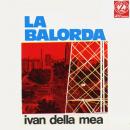
Chanson italienne – Caporetto '17 – Ivan Della Mea – 1973
Juste deux petites remarques : la première concerne le mot : « Hostie » (in italiano : ostia) qui dans un usage ancien – dans les deux langues – signifie : victime sacrificielle – j'ai préféré garder le mot tel quel (et non victime); la seconde, c'est de renvoyer pour le commentaire à Judith à Caporetto.
Ce Badoglio quand même..., dit Lucien l'âne en raclant le sol de colère rentrée. C'est un peu le Pétain italien... La vieille baderne qui avait conquis sa « gloire » sur la peau des autres, qui ordonna mille massacres, s'en courut dès qu'il le put, servit sous le régime et qu'on rappela en sauveur de la nation.... Le Saint Pierre de la chanson a bien raison... et Tonio encore plus, mieux vaut encore s'en aller au diable.... que fréquenter ces gens-là.
Ainsi Parlaient Marco Valdo M.I. et Lucien Lane
Juste deux petites remarques : la première concerne le mot : « Hostie » (in italiano : ostia) qui dans un usage ancien – dans les deux langues – signifie : victime sacrificielle – j'ai préféré garder le mot tel quel (et non victime); la seconde, c'est de renvoyer pour le commentaire à Judith à Caporetto.
Ce Badoglio quand même..., dit Lucien l'âne en raclant le sol de colère rentrée. C'est un peu le Pétain italien... La vieille baderne qui avait conquis sa « gloire » sur la peau des autres, qui ordonna mille massacres, s'en courut dès qu'il le put, servit sous le régime et qu'on rappela en sauveur de la nation.... Le Saint Pierre de la chanson a bien raison... et Tonio encore plus, mieux vaut encore s'en aller au diable.... que fréquenter ces gens-là.
Ainsi Parlaient Marco Valdo M.I. et Lucien Lane
CAPORETTO 1917
(Continues)
(Continues)
Contributed by Marco Valdo M.I. 2010/2/17 - 21:46
Act III Scene 2 (Shakespeare)
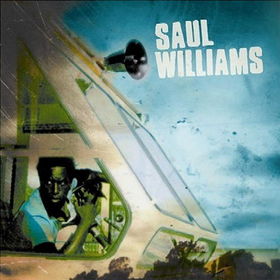
[2004]
Lyrics & Music by Saul Williams and Zack de la Rocha
Album: Saul Williams
Once the audience has been introduced to the central character, Saul Williams, the artist, and this central character has dealt with the current state of hip hop, he makes an open call to the youth of America, transcending hip hop and speaking to larger social issues:
"This is a call out to all the youth in the ghettos, suburbs, villages, townships: to all the kids who download this song for free. By any means. To all the kids short on loot but high on dreams. To all the kids watching TV like, yo, I wish that was me...I hear you. To all the people within the sound of my voice...".
Here, Williams again targets a large audience that transcends the hip hop community. He speaks to the youth of the world. He discusses the "state of affairs, likening the situation to Shakespeare's Julius Cæsar:
"Brutus... (Continues)
Lyrics & Music by Saul Williams and Zack de la Rocha
Album: Saul Williams
Once the audience has been introduced to the central character, Saul Williams, the artist, and this central character has dealt with the current state of hip hop, he makes an open call to the youth of America, transcending hip hop and speaking to larger social issues:
"This is a call out to all the youth in the ghettos, suburbs, villages, townships: to all the kids who download this song for free. By any means. To all the kids short on loot but high on dreams. To all the kids watching TV like, yo, I wish that was me...I hear you. To all the people within the sound of my voice...".
Here, Williams again targets a large audience that transcends the hip hop community. He speaks to the youth of the world. He discusses the "state of affairs, likening the situation to Shakespeare's Julius Cæsar:
"Brutus... (Continues)
This is a call out to all the youth..
(Continues)
(Continues)
Contributed by giorgio 2010/2/17 - 21:13
Streets of Sorrow
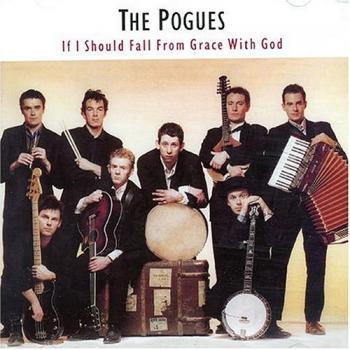
[1988]
Lyrics & Music by Terry Woods and Shane MacGowan
Album: If I Should Fall from Grace with God
Vedi anche un articolo di Silvia Morosi
Divided into two parts, the first ("Streets of Sorrow") written and sung by Woods, describing the pain and sadness on the streets of Northern Ireland at the height of the Troubles , the song is told from the point of view of someone who is leaving the place due to the increasing violence and conflict and who vows never to return "to see more sorrow, nor to see more young men slain".
The second part of the song ("Birmingham Six") written and sung by MacGowan, is a demonstration of support to the Birmingham Six and Guildford Four and the view that they were the victims of a miscarriage of justice and that their confessions had been extracted by torture at the hands of the West Midlands Serious Crime Squad, claiming "there were six men in Birmingham,... (Continues)
Lyrics & Music by Terry Woods and Shane MacGowan
Album: If I Should Fall from Grace with God
Vedi anche un articolo di Silvia Morosi
Divided into two parts, the first ("Streets of Sorrow") written and sung by Woods, describing the pain and sadness on the streets of Northern Ireland at the height of the Troubles , the song is told from the point of view of someone who is leaving the place due to the increasing violence and conflict and who vows never to return "to see more sorrow, nor to see more young men slain".
The second part of the song ("Birmingham Six") written and sung by MacGowan, is a demonstration of support to the Birmingham Six and Guildford Four and the view that they were the victims of a miscarriage of justice and that their confessions had been extracted by torture at the hands of the West Midlands Serious Crime Squad, claiming "there were six men in Birmingham,... (Continues)
Oh farewell you streets of sorrow
(Continues)
(Continues)
Contributed by giorgio 2010/2/17 - 17:30
Song Itineraries:
Conflicts in Ireland
L'homme en pain d'épice

L'homme en pain d'épice
L'homme en pain d'épice– Marco Valdo M.I. – 2010
Cycle du Cahier ligné – 89
L'homme en pain d'épice est la huitante-neuvième chanson du Cycle du Cahier ligné, constitué d'éléments tirés du Quaderno a Cancelli de Carlo Levi.
Comme tu le verras ou l'entendras, Lucien mon ami l'âne, la rêverie du prisonnier solitaire est comme un voyage autour de sa chambre, ce qui somme toute pourrait être le titre du Cycle du Cahier ligné, s'il n'existait déjà sous ce titre de Voyage autour de ma chambre, une sorte de longue nouvelle ou de roman d'un prisonnier. C'était au temps où l'Italie allait seulement devenir elle-même... Il était sous-titré, dans certaines éditions, ce qui pour nous a de l'importance : Expédition nocturne autour de ma chambre. Et la canzone d'aujourd'hui a comme titre « L'homme en pain d'épice » et commence par la description d'une simple chambre, une pièce... (Continues)
L'homme en pain d'épice– Marco Valdo M.I. – 2010
Cycle du Cahier ligné – 89
L'homme en pain d'épice est la huitante-neuvième chanson du Cycle du Cahier ligné, constitué d'éléments tirés du Quaderno a Cancelli de Carlo Levi.
Comme tu le verras ou l'entendras, Lucien mon ami l'âne, la rêverie du prisonnier solitaire est comme un voyage autour de sa chambre, ce qui somme toute pourrait être le titre du Cycle du Cahier ligné, s'il n'existait déjà sous ce titre de Voyage autour de ma chambre, une sorte de longue nouvelle ou de roman d'un prisonnier. C'était au temps où l'Italie allait seulement devenir elle-même... Il était sous-titré, dans certaines éditions, ce qui pour nous a de l'importance : Expédition nocturne autour de ma chambre. Et la canzone d'aujourd'hui a comme titre « L'homme en pain d'épice » et commence par la description d'une simple chambre, une pièce... (Continues)
Je contemple cette pièce dépouillée,
(Continues)
(Continues)
Contributed by Marco Valdo M.I. 2010/2/17 - 16:40
Ballate della violenza [Ballata della piccola e della grande violenza]
![Ballate della violenza [Ballata della piccola e della grande violenza]](img/thumb/c24873_130x140.jpeg?1417794420)
Version française – LA GRANDE ET LA PETITE VIOLENCE – Marco Valdo M.I.– 2010
Chanson italienne – La grande e la piccola violenza – Ivan Della Mea – 1962
« […] Entre 1957 et 1960, viennent au jour les ballades de LA GRANDE ET LA PETITE VIOLENCE. C'est ce moment où Ivan Della Mea …, puise impétueusement dans les souvenirs et les images taillées dans l'irruption féroce de l'enfance et de l'adolescence, fouettées par la furie guerrière et par les blessures post-bellum, donne une marque précise à son engagement politique et artistique.
Au travers des aventures familiales (« la petite violence ») – où le père, brigadier fasciste, revit ses moments d'exaltation et ceux de déconfiture... jusqu'à sa mort – il réussit à construire une fresque magistrale qui recueille globalement le climat, à la fois tragique et effervescent, de la période dictatoriale et de celle post-résitancielle de la restauration.... (Continues)
Chanson italienne – La grande e la piccola violenza – Ivan Della Mea – 1962
« […] Entre 1957 et 1960, viennent au jour les ballades de LA GRANDE ET LA PETITE VIOLENCE. C'est ce moment où Ivan Della Mea …, puise impétueusement dans les souvenirs et les images taillées dans l'irruption féroce de l'enfance et de l'adolescence, fouettées par la furie guerrière et par les blessures post-bellum, donne une marque précise à son engagement politique et artistique.
Au travers des aventures familiales (« la petite violence ») – où le père, brigadier fasciste, revit ses moments d'exaltation et ceux de déconfiture... jusqu'à sa mort – il réussit à construire une fresque magistrale qui recueille globalement le climat, à la fois tragique et effervescent, de la période dictatoriale et de celle post-résitancielle de la restauration.... (Continues)
LA GRANDE ET LA PETITE VIOLENCE
(Continues)
(Continues)
Contributed by Marco Valdo M.I. 2010/2/17 - 15:02
World Peace
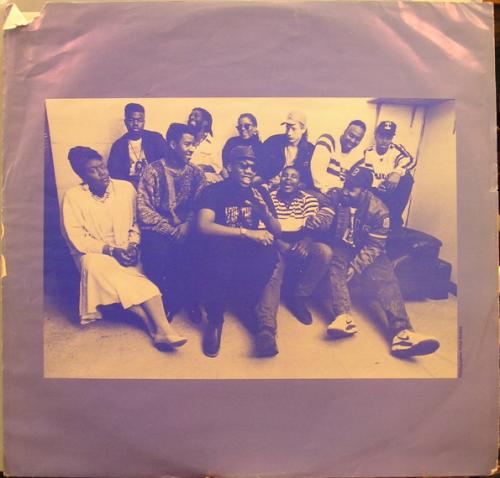
[1989]
Album "Ghetto Music: The Blueprint of Hip Hop"
Album "Ghetto Music: The Blueprint of Hip Hop"
World peace.. or world TALK?!
(Continues)
(Continues)
Contributed by Alessandro 2010/2/17 - 14:07
Who Protects Us From You?

[1989]
Album "Ghetto Music: The Blueprint of Hip Hop"
Album "Ghetto Music: The Blueprint of Hip Hop"
(Fy-ah! Come down fas'...)
(Continues)
(Continues)
Contributed by Alessandro 2010/2/17 - 14:03
Stop the Violence
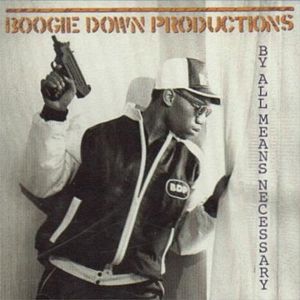
[1988]
Album "By All Means Necessary"
Album "By All Means Necessary"
Worldwide BDP are the freshest!
(Continues)
(Continues)
Contributed by Alessandro 2010/2/17 - 13:56
Mentioned In Dispatches

[1985]
Album "The Painted Word"
Album "The Painted Word"
He got no ribbons, no decorations
(Continues)
(Continues)
Contributed by Alessandro 2010/2/17 - 13:34
King and Country
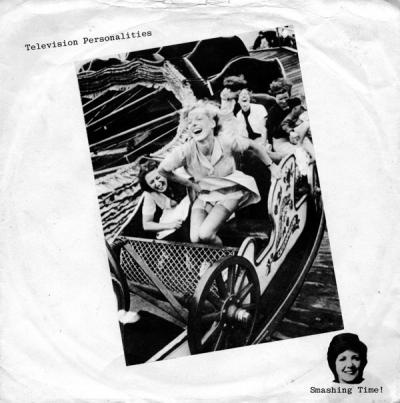
[1980]
Do you always clean your medals on a wet weekend?
(Continues)
(Continues)
Contributed by Alessandro 2010/2/17 - 13:28
Back To Vietnam
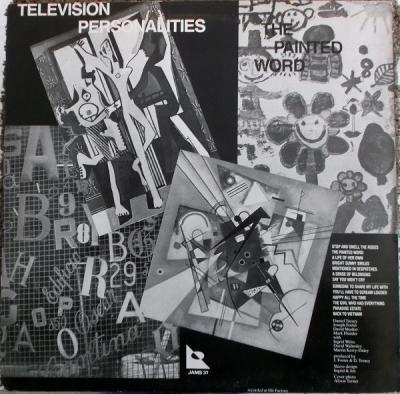
[1985]
Album "The Painted Word"
Album "The Painted Word"
He wakes up screaming
(Continues)
(Continues)
Contributed by Alessandro 2010/2/17 - 13:24
How I Learned To Love The Bomb

[1994]
Album "How I Learned To Love The Bomb"
Album "How I Learned To Love The Bomb"
Well there's no more sleepless nights for me
(Continues)
(Continues)
Contributed by Alessandro 2010/2/17 - 12:57
Le gorille
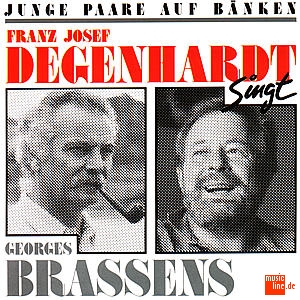
Die deutsche Fassung von Franz Josef Degenhardt
Come segnalato da Christoph Gerhard, fa parte dell'album Junge Paare auf Bänken (= "Les amoureux des bancs publics"), interamente composto di traduzioni da Brassens effettuate da Degenhardt. Una versione con qualche excursus nell'attualità tedesca ("als die Pershing zwo bei Heilbronn explodierte", ancora più decisamente contro la guerra...[CCG/AWS Staff]
VORSICHT GORILLA
(Continues)
(Continues)
Contributed by CCG/AWS Staff 2010/2/17 - 01:26
You Ain't Done Nothing If You Ain't Been Called a Red

[1986?]
Nell'LP "Swords into Plowshares", Folk Tradition.
Interpretata anche da Faith Petric e Mark Ross nel disco collettivo "Rebel Voices: Songs of the Industrial Workers of the World"
Nell'LP "Swords into Plowshares", Folk Tradition.
Interpretata anche da Faith Petric e Mark Ross nel disco collettivo "Rebel Voices: Songs of the Industrial Workers of the World"
When I was just a little thing I used to love parades
(Continues)
(Continues)
Contributed by Alessandro 2010/2/16 - 14:59
Clinton Got A Blowjob

Vabbè, una canzone divertente in cui si vorrebbe far passare Clinton, confrontandolo col perfido George W. Bush, come un presidente tanto "pacifista" da essersi interessato solo ai bocchini della Lewinsky... Trascura Schwartz di ricordare le nefandezze compiute da Clinton in Somalia, l'assordante silenzio sul genocidio in Rwanda, gli ingiustificati bombardamenti su insediamenti civili in Sudan, la guerra contro la Yugoslavia (con i bombardamenti su convogli di profughi, la distruzione del palazzo delle TV serba e dell'ambasciata cinese), i continui raid aerei e l'embargo feroce che causarono decine di migliaia di morti in Iraq tra la prima e la seconda guerra del Golfo, l'intensificazione del blocco contro il regime cubano...
Tuttavia, vi è di certo che Clinton subì un procedimento di impeachment a causa di un pompino, mentre quei gran figli di puttana di Bush e Blair, con tutte le loro... (Continues)
Tuttavia, vi è di certo che Clinton subì un procedimento di impeachment a causa di un pompino, mentre quei gran figli di puttana di Bush e Blair, con tutte le loro... (Continues)
George Bush lied about weapons of mass destruction
(Continues)
(Continues)
Contributed by Alessandro 2010/2/16 - 14:25
Keep Your Jesus Off My Penis
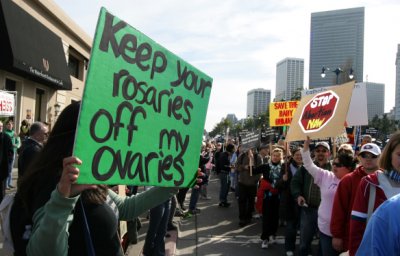
[2004]
Keep your Jesus off my penis
(Continues)
(Continues)
Contributed by Alessandro 2010/2/16 - 13:45
Song Itineraries:
Antiwar Anticlerical
Unplayed Piano
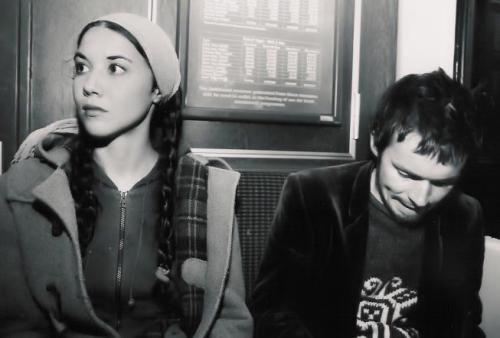
[2005]
Scritta da Damien Rice e Lisa Hannigan a sostegno della campagna per la liberazione della dissidente birmana Aung San Suu Kyi, sequestrata in casa sua dalla dittatura militare praticamente dal 1990...
Scritta da Damien Rice e Lisa Hannigan a sostegno della campagna per la liberazione della dissidente birmana Aung San Suu Kyi, sequestrata in casa sua dalla dittatura militare praticamente dal 1990...
Come and see me
(Continues)
(Continues)
Contributed by Alessandro 2010/2/16 - 13:05
(Something Inside) So Strong
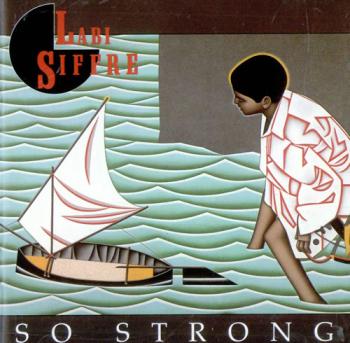
[1987]
Una canzone contro l'apartheid che Labi Siffre scrisse dopo essere rimasto sconvolto da un documentario in cui veniva mostrato un soldato del regime sudafricano che sparava a freddo su un bambino di colore...
Canzone scritta nel 1984 e poi inclusa nell'album intitolato "So Strong" del 1987.
La canzone fu ripresa con grande successo da Kenny Rogers nel 1989.
(Bernart Bartleby)
Una canzone contro l'apartheid che Labi Siffre scrisse dopo essere rimasto sconvolto da un documentario in cui veniva mostrato un soldato del regime sudafricano che sparava a freddo su un bambino di colore...
Canzone scritta nel 1984 e poi inclusa nell'album intitolato "So Strong" del 1987.
La canzone fu ripresa con grande successo da Kenny Rogers nel 1989.
(Bernart Bartleby)
The higher you build your barriers
(Continues)
(Continues)
Contributed by Alessandro 2010/2/16 - 12:45
Song Itineraries:
Apartheid, Institutionalized Racist Shame
Sullivan

[1993]
Lyrics & Music by James "Jimmy" P. Newquist
Album: Ignore The Ants [1995]
The song tells the true story of five siblings, the Sullivan brothers from Waterloo, Iowa, who died aboard the USS "Juneau" in WW2.
Lyrically, it focuses on Mrs. Sullivan's communication both with her sons and the military. Caroline's Spine singer and main songwriter Jimmy Newquist wrote the song after reading the war documentary Hollywood Goes to War. Regarding his inspiration, he remarked:
"Coming from a big family, the story of five brothers really struck home with me. . . I saw a news clipping with a photo of Mrs. Sullivan holding a banner with five gold stars - one for each of her dead sons. It's a really sad story with incredible loyalty and courage."
Newquist later noted, "The song was an act of love. . . I sleep well at night knowing that I brought attention to something that shouldn't be forgotten."... (Continues)
Lyrics & Music by James "Jimmy" P. Newquist
Album: Ignore The Ants [1995]
The song tells the true story of five siblings, the Sullivan brothers from Waterloo, Iowa, who died aboard the USS "Juneau" in WW2.
Lyrically, it focuses on Mrs. Sullivan's communication both with her sons and the military. Caroline's Spine singer and main songwriter Jimmy Newquist wrote the song after reading the war documentary Hollywood Goes to War. Regarding his inspiration, he remarked:
"Coming from a big family, the story of five brothers really struck home with me. . . I saw a news clipping with a photo of Mrs. Sullivan holding a banner with five gold stars - one for each of her dead sons. It's a really sad story with incredible loyalty and courage."
Newquist later noted, "The song was an act of love. . . I sleep well at night knowing that I brought attention to something that shouldn't be forgotten."... (Continues)
It's not hard to reach back to the day underneath that Iowa sun
(Continues)
(Continues)
Contributed by giorgio 2010/2/16 - 12:13
La marcha de la bronca
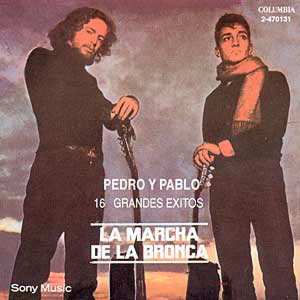
[1970]
Scritta da Miguel Cantilo
"Rabbia quando senza ragione mi obbligano a tagliarmi i capelli.
È meglio tenere i capelli lunghi che la libertà con il gel"
Un’altra incredibile canzone del duo argentino formato da Miguel Cantilo y Jorge Durietz, in arte Pedro y Pablo. Incredibile perché in Argentina nel 1970 c’era già la dittatura, quella di Onganìa, la prova generale del feroce regime che sarebbe seguito di lì a qualche anno.
Incredibile è pure come Pedro y Pablo siano sopravvissuti più tardi a Videla e ai suoi torturatori ed assassini.
Non ebbe la stessa fortuna Raymundo Gleyzer, reporter, critico cinematografico, cineasta e documentarista che nel 1973 scelse questa canzone per la colonna sonora del suo film “Los traidores”, storia di un sindacalista che da difensore dei lavoratori diventa il portavoce della destra e dei padroni (dovrebbero vederselo Bonanni e Angeletti!): Gleyzer fu sequestrato a Buenos Aires il 27 maggio 1976 mentre usciva dalla sede del Sindicato Cinematográfico Argentino.
È a tutt’oggi un “desaparecido”.
Scritta da Miguel Cantilo
"Rabbia quando senza ragione mi obbligano a tagliarmi i capelli.
È meglio tenere i capelli lunghi che la libertà con il gel"
Un’altra incredibile canzone del duo argentino formato da Miguel Cantilo y Jorge Durietz, in arte Pedro y Pablo. Incredibile perché in Argentina nel 1970 c’era già la dittatura, quella di Onganìa, la prova generale del feroce regime che sarebbe seguito di lì a qualche anno.
Incredibile è pure come Pedro y Pablo siano sopravvissuti più tardi a Videla e ai suoi torturatori ed assassini.
Non ebbe la stessa fortuna Raymundo Gleyzer, reporter, critico cinematografico, cineasta e documentarista che nel 1973 scelse questa canzone per la colonna sonora del suo film “Los traidores”, storia di un sindacalista che da difensore dei lavoratori diventa il portavoce della destra e dei padroni (dovrebbero vederselo Bonanni e Angeletti!): Gleyzer fu sequestrato a Buenos Aires il 27 maggio 1976 mentre usciva dalla sede del Sindicato Cinematográfico Argentino.
È a tutt’oggi un “desaparecido”.
Bronca cuando ríen satisfechos
(Continues)
(Continues)
Contributed by Alessandro 2010/2/16 - 11:51
Reuters
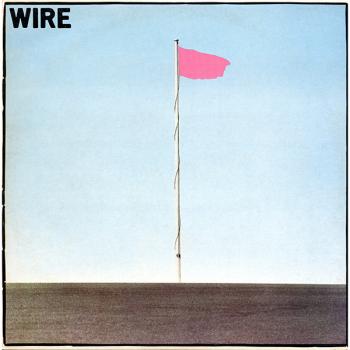
[1977]
Album "Pink Flag"
Album "Pink Flag"
Our own correspondent is sorry to tell
(Continues)
(Continues)
Contributed by Alessandro 2010/2/16 - 11:21
VietNam Blues

[1966]
Lyrics by Dave Dudley
Lyrics by Dave Dudley
I was out on the leave at the time just duckin' the fog
(Continues)
(Continues)
Contributed by giorgio 2010/2/16 - 08:08
Song Itineraries:
War in Viet Nam as seen from the U.S.
Le gorille

Deutsche Fassung von Christoph Gerhard
Eine nicht wörtliche aber singbare deutsche Version von Ende der 70-er Jahre, die auf der italienischen Version von Fabrizio de André basiert. (Es gibt übrigens auch eine deutsche Version und Interpretation von Franz-Josef Degenhardt von 1986 auf der LP "Junge Paare auf Bänken", auf der er Chansons von Georges Brassens ins Deutsche übertragen hat.)
Una versione tedesca non del tutto letterale ma cantabile dalla fine degli anni 70, basata sulla versione italiana di Fabrizio de André. (Esiste comunque anche una versione e interpretazione di Franz-Josef Degenhardt del 1986, pubblicata sul LP "Junge Paare auf Bänken", che porta solamente delle canzoni di Brassens.)
Una versione tedesca non del tutto letterale ma cantabile dalla fine degli anni 70, basata sulla versione italiana di Fabrizio de André. (Esiste comunque anche una versione e interpretazione di Franz-Josef Degenhardt del 1986, pubblicata sul LP "Junge Paare auf Bänken", che porta solamente delle canzoni di Brassens.)
DER GORILLA
(Continues)
(Continues)
Contributed by Christoph Gerhard 2010/2/16 - 02:08
Great Dictator (Of the Free World)
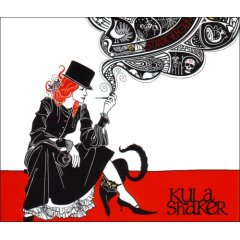
[2007]
Album "Strangefolk"
Dedicata a Monsieur Berlus(le)con, il piccolo dittatore di questo nostro sordido, laido, viscido, purulento, infetto, lurido porno-paese...
Dio è (Berlus)con noi!!!
Album "Strangefolk"
Dedicata a Monsieur Berlus(le)con, il piccolo dittatore di questo nostro sordido, laido, viscido, purulento, infetto, lurido porno-paese...
Dio è (Berlus)con noi!!!
I'm an A1 Major League sociopath
(Continues)
(Continues)
Contributed by Alessandro 2010/2/15 - 23:51
Our Only Weapon
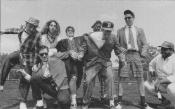
[1993]
Album "Don't Know How to Party"
Album "Don't Know How to Party"
Read the paper, things look grim
(Continues)
(Continues)
Contributed by Alessandro 2010/2/15 - 23:30
Guns And The Young
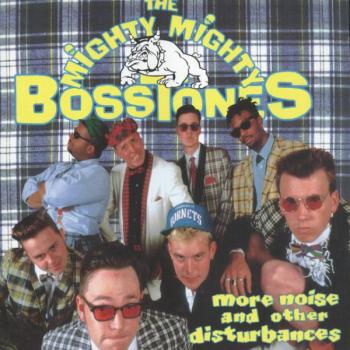
[1991]
Album "More Noise and Other Disturbances"
Album "More Noise and Other Disturbances"
Police have no suspects yet...
(Continues)
(Continues)
Contributed by Alessandro 2010/2/15 - 23:27
Georges Brassens: Les passantes
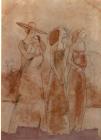
Deutsche Fassung von Christoph Gerhard
Eine deutsche gereimte und singbare Version, geschrieben Ende der 70-er Jahre, die auf der Übertragung von Fabrizio de André ins Italienische basiert.
Una versione in rima e cantabile, scritta alla fine degli anni 70 e basata sulla versione italiana di Fabrizio de André.
Una versione in rima e cantabile, scritta alla fine degli anni 70 e basata sulla versione italiana di Fabrizio de André.
VORÜBERGEHEND (DIE PASSANTINNEN)
(Continues)
(Continues)
Contributed by Christoph Gerhard 2010/2/15 - 23:26
Auschwitz, o Canzone del bambino nel vento

TEDESCO / GERMAN / ALLEMAND / SAKSA [3]
Versione tedesca di Christoph Gerhard
Deutsche Version von Christoph Gerhard
German version by Christoph Gerhard
Version allemande de Christoph Gerhard
Christoph Gerhardin saksankielinen versio
[ > 1980]
Versione tedesca di Christoph Gerhard
Deutsche Version von Christoph Gerhard
German version by Christoph Gerhard
Version allemande de Christoph Gerhard
Christoph Gerhardin saksankielinen versio
[ > 1980]
Ancora una versione cantabile (basta che gli ultimi due versi - che poi sono una ripetizione - si rimano), scritta nei primi anni ottanta.
Noch eine singbare Version (es reicht ja, dass die beiden letzten Verse - die auch noch eine Wiederholung sind - sich reimen), geschrieben Anfang der 80-er Jahre.
Noch eine singbare Version (es reicht ja, dass die beiden letzten Verse - die auch noch eine Wiederholung sind - sich reimen), geschrieben Anfang der 80-er Jahre.
AUSCHWITZ
(Continues)
(Continues)
Contributed by Christoph Gerhard 2010/2/15 - 22:04
La ballata dell'eroe
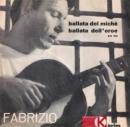
Deutsche Fassung von Christoph Gerhard
Una versione tedesca non del tutto letterale ma con delle rime e così cantabile, scritta nei primi anni ottanta.
Eine deutsche, nicht ganz wörtliche Version, aber mit Reimen und deshalb singbar, geschrieben in den frühen 80-er Jahren.
Eine deutsche, nicht ganz wörtliche Version, aber mit Reimen und deshalb singbar, geschrieben in den frühen 80-er Jahren.
DIE BALLADE VOM HELDEN
(Continues)
(Continues)
Contributed by Christoph Gerhard 2010/2/15 - 21:39
Fila la lana
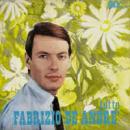
Deutsche Fassung von Christoph Gerhard
É una versione tedesca non letterale ma cantabile in tedesco che ho scritto già nei primi anni ottanta, un po' modificata adesso, nel 2010, grazie alle informazioni del sito "Canzoni contro la guerra" che per fortuna ho trovato cercando dei fatti più esatti sulla Guerra di Valois ed il Signor de Vly.
Dies ist eine deutsche Fassung, die nicht wörtlich, aber in Deutsch singbar ist. Ich habe sie schon in den frühen 80-er Jahren verfasst und jetzt leicht verändert aufgrund der Informationen der Website "Canzoni contro la guerra", welche ich glücklicherweise gefunden habe, als ich Genaueres über den Hundertjährigen Krieg und den Herrn von Vly suchte.
Dies ist eine deutsche Fassung, die nicht wörtlich, aber in Deutsch singbar ist. Ich habe sie schon in den frühen 80-er Jahren verfasst und jetzt leicht verändert aufgrund der Informationen der Website "Canzoni contro la guerra", welche ich glücklicherweise gefunden habe, als ich Genaueres über den Hundertjährigen Krieg und den Herrn von Vly suchte.
BALLADE VOM HUNDERTJÄHRIGEN KRIEG
(Continues)
(Continues)
Contributed by Christoph Gerhard 2010/2/15 - 19:47
War Sucks, Let's Party!
[2006]
Songwriters: Christopher Mark Head, Justin Cathal Geever, Patrick Christ Bollinger, Christopher Lee Barker.
Album: For Blood and Empire
Songwriters: Christopher Mark Head, Justin Cathal Geever, Patrick Christ Bollinger, Christopher Lee Barker.
Album: For Blood and Empire
The Anarchists are positive like bees around a hive
(Continues)
(Continues)
Contributed by giorgio 2010/2/15 - 19:36
Su patriottu Sardu a sos feudatarios [Procurad' e moderare]
![Su patriottu Sardu a sos feudatarios [Procurad' e moderare]](img/thumb/c5768_130x140.jpeg?1652257123)
la nostra essenza per avere speranza
mario coccu 2010/2/15 - 19:32
L'Hélicon de Berluscon

L'Hélicon de Berluscon
Parodie de langue française – L'Hélicon de Berluscon – Lucien Lane – 2010
d'après L'Hélicon – Boby Lapointe, 1963
Oh, oh, Marco Valdo M.I. mon ami, je viens de faire une parodie.
Encore... et à propos de quoi ? De qui ?
Tu connais Boby Lapointe... Je sais que tu le connais et même, presque par cœur... Moi aussi d'ailleurs. J'adore ses chansons. L'ennui, c'est qu'elles sont d'un genre particulier, celui de Boby très précisément. Et qu'elles ont peu de chance d'être dans les CCG. Pourtant, à mon sens, elles devraient y être, parce que... comment dire ?, elles sont par nature des Chansons contre la Guerre. Boby était un gars éminemment pacifique et amilitariste. « Une idée de l'adjudant, qu'en avait très peu pourtant... des idées... »... Il était tellement amilitariste qu'il n'a jamais fait de chansons explicitement contre la guerre... Cela dit, il nous a donné... (Continues)
Parodie de langue française – L'Hélicon de Berluscon – Lucien Lane – 2010
d'après L'Hélicon – Boby Lapointe, 1963
Oh, oh, Marco Valdo M.I. mon ami, je viens de faire une parodie.
Encore... et à propos de quoi ? De qui ?
Tu connais Boby Lapointe... Je sais que tu le connais et même, presque par cœur... Moi aussi d'ailleurs. J'adore ses chansons. L'ennui, c'est qu'elles sont d'un genre particulier, celui de Boby très précisément. Et qu'elles ont peu de chance d'être dans les CCG. Pourtant, à mon sens, elles devraient y être, parce que... comment dire ?, elles sont par nature des Chansons contre la Guerre. Boby était un gars éminemment pacifique et amilitariste. « Une idée de l'adjudant, qu'en avait très peu pourtant... des idées... »... Il était tellement amilitariste qu'il n'a jamais fait de chansons explicitement contre la guerre... Cela dit, il nous a donné... (Continues)
Silvio, tu as déjà passé septante ans
(Continues)
(Continues)
Contributed by Lucien Lane 2010/2/15 - 14:11
Antiglobalizzazione
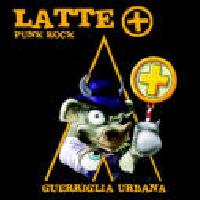
[2002]
Album : Guerriglia urbana
Album : Guerriglia urbana
Accendo la tv e a volte non ci credo
(Continues)
(Continues)
Contributed by adriana 2010/2/15 - 11:01
Il sud del mondo
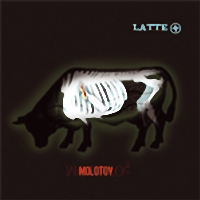
[2005]
Album:Molotov
Album:Molotov
Benvenuti nel sud del mondo!
(Continues)
(Continues)
Contributed by adriana 2010/2/15 - 10:55
Fermate la guerra

[2005]
Album:Molotov
Album:Molotov
Sogno una parola che si chiama liberta’...
(Continues)
(Continues)
Contributed by adriana 2010/2/15 - 10:50
Tout finit ici

Tout finit ici
Canzone léviane – Tout finit ici – Marco Valdo M.I. – 2010
Cycle du Cahier ligné – 88
Tout finit ici est la huitante-huitième chanson du Cycle du Cahier ligné, constitué d'éléments tirés du Quaderno a Cancelli de Carlo Levi.
Tout finit ici est la huitante-huitième chanson du Cycle du Cahier ligné, constitué d'éléments tirés du Quaderno a Cancelli de Carlo Levi.
On pourrait croire, vois-tu Lucien mon ami l'âne aux yeux froncés, on pourrait croire qu'avec un titre pareil : Tout finit ici, que c'est la fin de tout, que notre ami le prisonnier-blessé-guerrier est définitivement désespéré. Qu'il s'est effondré, au moins moralement. On pourrait le croire, mais rassure-toi, il n'en est rien. Même s'il ressent une sorte de dépression, d'accès de mélancolie, de plongée dans la mer de la tristesse et de fatalité... Ce n'est pas la dernière canzone.
J'espère bien, car elle est... (Continues)
Canzone léviane – Tout finit ici – Marco Valdo M.I. – 2010
Cycle du Cahier ligné – 88
Tout finit ici est la huitante-huitième chanson du Cycle du Cahier ligné, constitué d'éléments tirés du Quaderno a Cancelli de Carlo Levi.
Tout finit ici est la huitante-huitième chanson du Cycle du Cahier ligné, constitué d'éléments tirés du Quaderno a Cancelli de Carlo Levi.
On pourrait croire, vois-tu Lucien mon ami l'âne aux yeux froncés, on pourrait croire qu'avec un titre pareil : Tout finit ici, que c'est la fin de tout, que notre ami le prisonnier-blessé-guerrier est définitivement désespéré. Qu'il s'est effondré, au moins moralement. On pourrait le croire, mais rassure-toi, il n'en est rien. Même s'il ressent une sorte de dépression, d'accès de mélancolie, de plongée dans la mer de la tristesse et de fatalité... Ce n'est pas la dernière canzone.
J'espère bien, car elle est... (Continues)
Tout ici est comme moisi
(Continues)
(Continues)
Contributed by Marco Valdo M.I. 2010/2/15 - 10:14
Il prete visionario

No non sono una favola, una parabola: anche don Zeno era un "prete visionario" !
Maria Cristina 2010/2/15 - 09:28
Unfinished Revolution
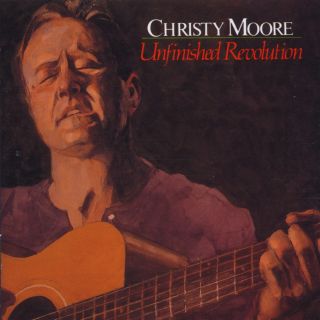
[1987]
Albm "Unfinished Revolution"
Scritta da Peter Cadle
Albm "Unfinished Revolution"
Scritta da Peter Cadle
From the health centre porch she looks to the North
(Continues)
(Continues)
Contributed by Alessandro 2010/2/15 - 09:26
Natives
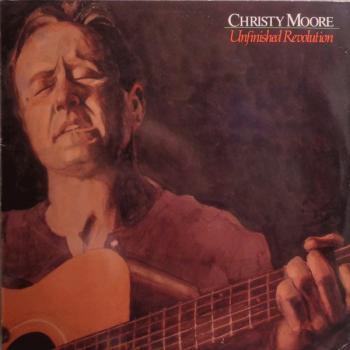
[1987]
Album "Unfinished Revolution"
Scritta da Paul Doran
Album "Unfinished Revolution"
Scritta da Paul Doran
For all of our languages we can't communicate
(Continues)
(Continues)
Contributed by Alessandro 2010/2/15 - 09:23
Ordinary Man

[1985]
Album "Ordinary Man"
Scritta da Peter Hames
Album "Ordinary Man"
Scritta da Peter Hames
I'm an ordinary man, nothing special nothing grand
(Continues)
(Continues)
Contributed by Alessandro 2010/2/15 - 09:17
×
![]()





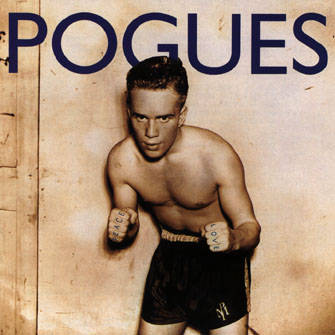
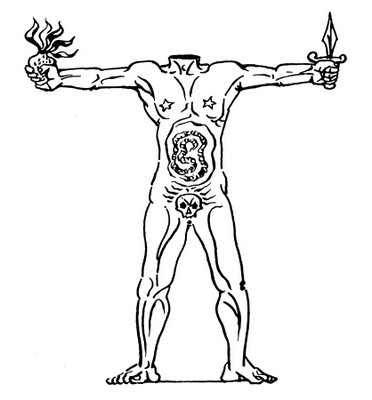


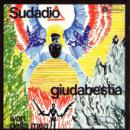
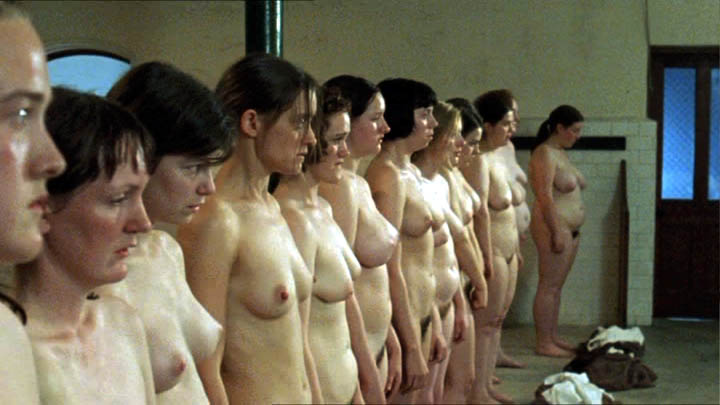
CARI AMICI, sono GIANFRANCO GINESTRI (ex del CANZONIERE DELLE LAME DI BOLOGNA). Vi scrivo per dirvi che il grande reporter ENZO BIAGI fece il partigiano (col nome di battaglia "GIORNALISTA") nella BRIGATA GIUSTIZIA E LIBERTA' che operava nella zona appenninica del CORNO ALLE SCALE (tra CASTELLUCCIO BOLOGNESE e CASTELLUCCIO MODENESE).
Siccome ENZO BIAGI amava molto la canzone partigiana "BELLA CIAO" (che fu composta da anonimi partigiani in questa zona nell'inverno 1944-45) al suo funerale svoltosi a Pianaccio, il Coro Maschile di Gaggio Montano, su incarico della figlia BICE BIAGI, la cantò in diretta televisiva nella versione classica che tutti conosciamo.
Concludo dicendovi che però i partigiani di GIUSTIZIA e LIBERTA' cantavano la stofa finale con le seguenti parole:
Era rossa la sua bandiera,
o bella ciao, bella ciao, bella ciao ciao... (Continues)